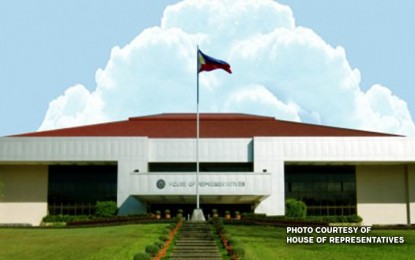The House of Representatives has approved on second reading last Wednesday evening the proposal to amend the restrictive economic provisions in the 1987 Constitution.
Voting viva voce, the House passed Resolution of Both Houses No. 2, which proposes economic amendments to the Charter to open up the Philippines to direct foreign investments that could help the country recover from the disasters inflicted by the Covid-19 pandemic.
Principally authored by Speaker Lord Allan Velasco, the proposal seeks to insert the phrase “unless otherwise provided by law” to several sections of the Constitution that restrict foreign ownership of public utilities, educational institutions, media, and advertising firms.
The proposal also seeks to amend certain economic provisions of the Charter, particularly Articles XII (National Economy and Patrimony), XIV (Education, Science, Technology, Arts, Culture, and Sports), and XVI (General Provisions).
AKO BICOL Party-List Rep. Alfredo Garbin Jr., who chairs the House Committee on Constitutional Amendments, said the proposed amendments would eliminate the “overly protective” provisions – such as foreign ownership limitations in business enterprises, including public utilities – to attract more foreign investments and to adopt policies to enable the country to be more competitive in the global economy.
“It will contribute to our local economy, will bring in long-term capital that will significantly increase job opportunitiesfor our countrymen, and most importantly, facilitate technology transfer,” Garbin said.
Albay Rep. Joey Salceda, a principal sponsor of the resolution, cited a study from the Organisation for Economic Cooperation and Development (OECD) which outlined top investment barriers, three of which are present in the Philippines because of the economic restrictions in the Constitution.
Salceda said these barriers include “foreign ownership restrictions in the law, stipulations on management, such as regulations that nationals or residents must form a majority of the board of directors, and nationality-based restrictions on operations.”
Salceda said the Philippines is also the most restrictive on most foreign direct investment (FDI) in the Association of Southeast Asian Nations (Asean) region.
“We have the most doors closed of any Asean country. And we expect visitors to come. This makes no economic or logical sense. We need investments to come. So, what makes sense is to open the doors that we can,” he added.
Based on the 2019 OECD FDI restrictiveness index, the Philippines has the highest restrictiveness score of any country in the Asean region.
Salceda pointed out that the Philippines has locked itself out of significant foreign investments, and therefore job creation. “We have spent hundreds of billions of pesos in foregone revenue for tax incentives when we have not tried a simpler, cheaper solution: opening industries in need of capital to foreign investment through legislative action. Instead of sending our labor force abroad, let us attract foreign investment and create the jobs here in the Philippines,” he stressed.
